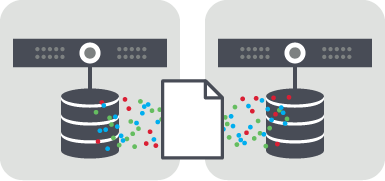c-treeACE users have long enjoyed the ease of managing their physical data and index files alongside their applications. Easily moving and copying files between servers is a consistent need required by our customers, especially as they transition applications to centrally processed c-treeACE server technology. A file copy function makes this a seamless effort directly from the application layer. File transfer is now done server-to-server in addition to a client/server transfer feature introduced in V10.
The function ctCopyFile() copies a c-tree data or index file, or a c-tree data file and its associated index files. The caller specifies the source and destination file names and options that affect the behavior of the file copy. c-tree copies the files synchronously. That is, the copy call does not return until the file copy is completed.
To copy a file, a caller must be authorized by c-tree (including the file system) to open a file for read access. ADMIN user is always granted read permission for all files. (c-tree file permissions are only supported in the client/server model and not with standalone usage.)
c-tree attempts to open the file in exclusive mode, while still allowing other connections to open the file for read access. If the file is already open, c-tree flushes updates to disk and sets the update flag to zero to indicate that the file is in a clean, consistent state. If c-tree cannot open the file in exclusive mode, the copy operation fails.
Note: Files with an .FCS extension (such as FAIRCOM.FCS, SYSLOGDT.FCS, L0000001.FCS, SNAPSHOT.FCS, etc.) are considered to be a c-tree internal system housekeeping files. The file copy function does not allow copying from or to c-tree internal system files. An attempt to copy such a file fails with error code 1013 (SCPY_ERR).

Copying c-tree files
When copying a c-tree file, c-tree assigns a new file ID to the copy of the file so that the file ID does not match the original file’s ID, and c-tree sets the data and index file and directory names in the data file’s IFIL resource to the names of the new copies of the files. Other than those differences, the copied file is identical to the original file: it contains the same active and deleted data records or index nodes and key values, resources, and has the same properties as the original file, including:
The caller indicates what action to take when a file already exists with the same name as the specified destination file. By default, the file copy fails in this situation, but the caller can specify that the existing file should be deleted instead.
When copying multiple files (for example when copying a data file and its associated index files), if an error occurs c-tree stops the file copy operation and deletes all files that were successfully copied. If desired, the caller can specify an option to keep all the successfully copied files in case of an error.
An optional callback mechanism is available for supporting user feedback progress bars based on percentage of file copy complete.
See also